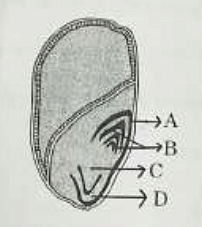Question:
Which of the following is true for essentiality of germination?
(A) Viability of seed
(B) Proper environment
(C) Seed free from dormancy
(D) Thin seed coat
Which of the following is true for essentiality of germination?
(A) Viability of seed
(B) Proper environment
(C) Seed free from dormancy
(D) Thin seed coat
(B) Proper environment
(C) Seed free from dormancy
(D) Thin seed coat
Show Hint
For a seed to germinate, it must be:
Viable (alive): The embryo must be capable of growth.
In a Proper Environment: Needs suitable water, temperature, oxygen (and sometimes light).
Free from Dormancy: Any internal blocks to germination must be overcome. A thin seed coat is not a universal requirement; many seeds with substantial seed coats germinate fine once other conditions are met.
Viable (alive): The embryo must be capable of growth.
In a Proper Environment: Needs suitable water, temperature, oxygen (and sometimes light).
Free from Dormancy: Any internal blocks to germination must be overcome. A thin seed coat is not a universal requirement; many seeds with substantial seed coats germinate fine once other conditions are met.
Updated On: Jun 3, 2025
- (A), (B) and (D) only
- (A) and (C) only
- (A), (B) and (C) only
- (A), (C) and (D) only
Hide Solution
Verified By Collegedunia
The Correct Option is C
Solution and Explanation
For a seed to germinate successfully, several conditions must be met. Let's evaluate the given factors:
(A) Viability of seed: This is absolutely essential. A seed must be alive, meaning its embryo is capable of growth and development. A non-viable (dead) seed cannot germinate. So, (A) is true.
(B) Proper environment: This is also essential. Seeds require suitable environmental conditions for germination, which typically include adequate moisture (water), appropriate temperature, and oxygen. Some seeds also have specific light requirements. So, (B) is true.
(C) Seed free from dormancy: This is essential. Dormancy is a state where a viable seed will not germinate even if provided with favorable environmental conditions. The dormancy must be broken (naturally or artificially) for germination to occur. So, (C) is true.
(D) Thin seed coat: This is not universally essential for germination. While a very thick or impermeable seed coat can impose dormancy (physical dormancy) and prevent water uptake or gas exchange, many viable, non-dormant seeds with moderately thick seed coats germinate perfectly well. A thin seed coat might facilitate faster germination in some cases but is not a fundamental requirement for all seeds to germinate. Some seeds require scarification (abrading the seed coat) if it's too hard, but that relates to overcoming dormancy, not an essential feature of all germinable seeds. Therefore, the essential factors for germination from the list are viability, proper environment, and freedom from dormancy. This corresponds to option (3). (A), (B) and (C) only
(A) Viability of seed: This is absolutely essential. A seed must be alive, meaning its embryo is capable of growth and development. A non-viable (dead) seed cannot germinate. So, (A) is true.
(B) Proper environment: This is also essential. Seeds require suitable environmental conditions for germination, which typically include adequate moisture (water), appropriate temperature, and oxygen. Some seeds also have specific light requirements. So, (B) is true.
(C) Seed free from dormancy: This is essential. Dormancy is a state where a viable seed will not germinate even if provided with favorable environmental conditions. The dormancy must be broken (naturally or artificially) for germination to occur. So, (C) is true.
(D) Thin seed coat: This is not universally essential for germination. While a very thick or impermeable seed coat can impose dormancy (physical dormancy) and prevent water uptake or gas exchange, many viable, non-dormant seeds with moderately thick seed coats germinate perfectly well. A thin seed coat might facilitate faster germination in some cases but is not a fundamental requirement for all seeds to germinate. Some seeds require scarification (abrading the seed coat) if it's too hard, but that relates to overcoming dormancy, not an essential feature of all germinable seeds. Therefore, the essential factors for germination from the list are viability, proper environment, and freedom from dormancy. This corresponds to option (3). (A), (B) and (C) only
Was this answer helpful?
0
0
Top Questions on The Seed
- In the seeds of cereals, the outer covering of endosperm separates the embryo by a protein-rich layer called:
- Match the content of List I with List II:Choose the correct option from the following :
List-I List-II 1 Polyembryony p Black pepper 2 Perisperm q Banana 3 False fruit r Lemon 4 Parthenocarpy s Apple - KCET - 2024
- Biology
- The Seed
Identify the part of the seed from the given figure which is destined to form root when the seed germinates.

- What is the ideal seed rate for okra for rainy season crop?
- Which of the following annuals require the isolation distance of 50-100 meters for seed production?
(A) Antirrhinum
(B) Marigold
(C) Larkspur
(D) Nasturtium
Choose the correct answer from the options given below:
View More Questions
Questions Asked in ICAR AIEEA exam
- Which fiber is known for its excellent moisture-wicking properties, making it ideal for active wear?
- Which is NOT a feature of a cooperative society?
- ICAR AIEEA (PG) - 2025
- Marketing
- Which is the recommended protein level for carp grow-out feed?
- ICAR AIEEA (PG) - 2025
- Fish Nutrition
- The 'Law of the Minimum' was proposed by:
- ICAR AIEEA (PG) - 2025
- Agronomic Principles
- In the context of agribusiness, SWOT analysis is used to assess:
- ICAR AIEEA (PG) - 2025
- Principles and Functions of Management
View More Questions